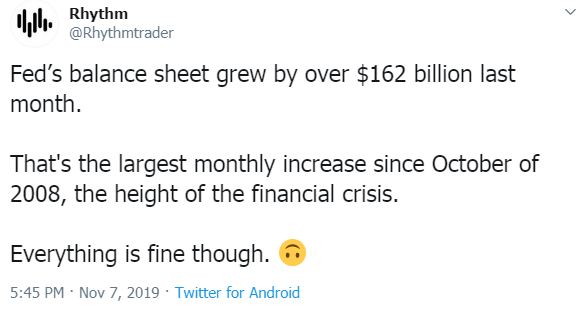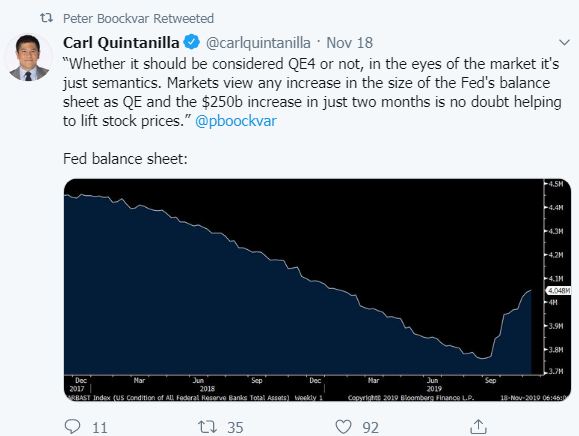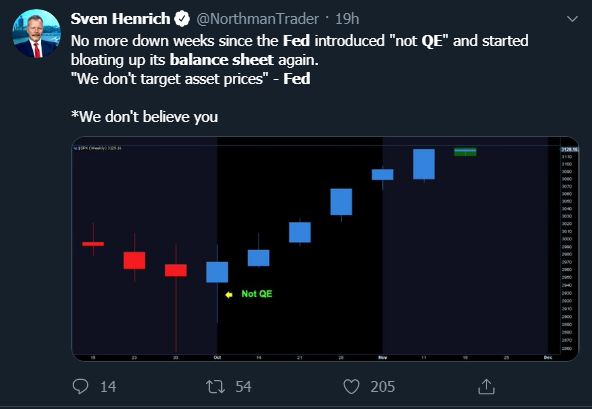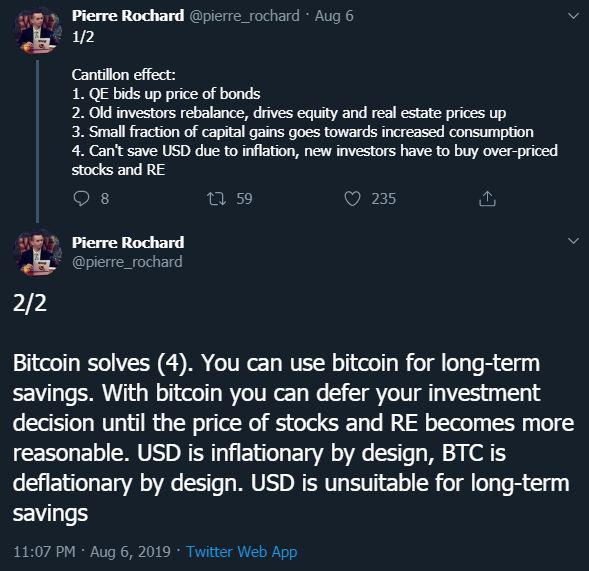What the Fed Reserve's Balance Sheet Expansion Means for Bitcoin
The U.S. Federal Reserve is again expanding its balance sheet – prominent experts believe that could bode well for bitcoin in the long run.
:format(jpg)/cloudfront-us-east-1.images.arcpublishing.com/coindesk/JDZPHBH5GRBPDKWNBBEPJMOIW4.jpg)
The U.S. Federal Reserve is again expanding its balance sheet and prominent experts believe that could bode well for bitcoin in the long run.
The U.S. central bank's balance sheet includes a large number of distinct assets and liabilities. When interest rates begin to rise, the Fed pumps more money into the system by buying treasuries. The banks, therefore, have more cash available to lend and lower interest rates.
In October, the Fed's assets grew by over $162 billion to register the biggest monthly rise since 2008.
Popular analyst @Rhythmtrader hinted this was a sign of impending turmoil, the kind bitcoin is supposed to be a haven from, in a Nov. 7 tweet.

Further, $270 billion has been reportedly added to the balance sheet since Sept. 11, which implies an average daily growth rate of $5.8 billion. As of Nov. 15, the Fed’s total assets were $4.04 trillion, according to the Federal Reserve Bank of St. Louis.
Fed intervenes in money markets
The central bank again started buying treasuries after the money markets went haywire in September, pushing short-term rates as high as 10 percent, threatening to disrupt the overall lending system.
It's worth noting that the Fed does not have the authority to enforce a particular federal funds rate and instead influences the money supply to keep rates in the target range, currently 1.5 to 1.75 percent.
When interest rates begin to rise, it pumps more money into the economy. The banks, therefore, have more cash available to lend and lower interest rates.
Back in September, the target range was 1.75 to 2 percent. So, with rates spiking as high as 10 percent, the Fed was compelled to spring to action.
Markets don't believe the Fed
Fed Reserve chairman Jerome Powell has repeatedly said that treasury purchases are not quantitative easing (QE), whereby the central bank snaps up government bonds to boost the money supply and buttress economic growth.
Experts, however, believe the central bank is in effect implementing round four of the QE program, following three rounds between 2009 and 2015.
“The burst in the repo market is telling us that risk and debt accumulation are much higher than estimated and it has taken a disguised QE program to mildly contain it,” Daniel Lacalle, author of "Escape from the Central Bank Trap" wrote in an article for mises.org.
Meanwhile, Peter Boockvar, chief investment officer of Bleakley Advisory Group, editor of The Boock Report and CNBC contributor, is of the opinion that the markets view any increase in the size of the Fed’s balance sheet as QE.

The recent rally in the US stock market also indicates the investors are not buying the Fed’s rhetoric and are viewing the ongoing balance sheet expansion as QE, as pointed out by Sven Henrich, popularly known as NorthmanTrader.

The S&P 500 rallied for six straight weeks, starting from the second week of October to the second week of November. The index fell by 0.33 percent last week only to clock a fresh record high of 3,154 on Wednesday.
BTC a hedge against monetary indiscipline?
The popular narrative in the crypto markets is that bitcoin is effectively digital gold and a hedge against monetary and fiscal indiscipline.
Anthony Pompliano, founder and partner at Morgan Creek Digital Assets told CoinDesk:
Indeed, the top cryptocurrency’s monetary policy is fixed – the mining rewards are reduced by 50 percent every four years. Essentially, the pace of supply expansion is reduced by half every four years as opposed to major central banks, which have been expanding money supply since 2009.
Looking ahead, the Fed is likely to continue expanding its balance sheet in the near future, as the money market is unlikely to return to normalcy any time soon, according to JPMorgan Chase. With bitcoin set to cut miner rewards next May, the bitcoin-Fed monetary policy divergence is set to widen further.
It's therefore not surprising that the likes of Cameron Winklevoss, founder of Winklevoss Capital Management, are extremely bullish on BTC:

Bitcoin may benefit from QE's Cantillon Effect
The Cantillon Effect refers to the change in relative prices resulting from a shift in the money supply. It argues that money injection (QE and other inflation-boosting policies) may not change an economy’s output over the long-term. However, as newly created money travels through the economy, it affects different sectors of the economy differently.
For instance, the expected increase in the money supply due to QE or rate cuts is first priced in by financial markets. Put simply, people who are most invested in the stock market, real estate are the first to benefit from the inflationary policies.
By the time new investors enter the market, the assets are already overpriced. Further, saving becomes difficult with low-interest rates and the falling purchasing power of the currency.
A prolonged period of QE, therefore, may force investors to diversify their investments into bitcoin, which is deflationary in nature, as noted by analyst Pierre Rochard in August.

Backing Rochard’s view is Gabor Gurbacs, digital asset strategist/director at VanEck/MVIS, who told CoinDesk that both bitcoin and gold could benefit from QE-led dollar devaluation and asset inflation.
Gurbacs said:
Some may argue that BTC is not a haven asset and tends to track equities more closely.
"Prior bitcoin bull runs were characterized by a gradual decline in equity market volatility. For example, we’ve noted its, albeit imperfect, inverse relationship with the VIX Index over longer time horizons (i.e. 2017 run-up)," according to analysts at Delphi Digital.
Even if we consider BTC a risky asset, the Fed’s QE still appears to be a price-bullish development.
The central bank conducted three rounds of QE between 2009 and 2015, during which time the S&P 500, a benchmark for risk assets across the globe, rallied by more than 200 percent. Gold, a classic safe-haven asset, rose from $800 to $1,921 in the three years to 2011 only to fall back to $1,050 by December 2015.
Disclosure: The author holds no cryptocurrency at the time of writing.
/arc-photo-coindesk/arc2-prod/public/LXF2COBSKBCNHNRE3WTK2BZ7GE.png)
:format(jpg)/downloads.coindesk.com/arc/failsafe/user/1x1.png)